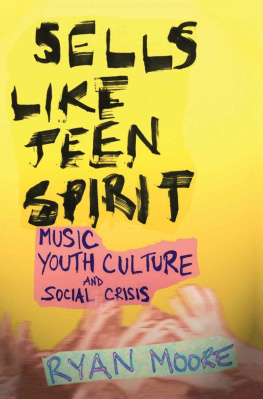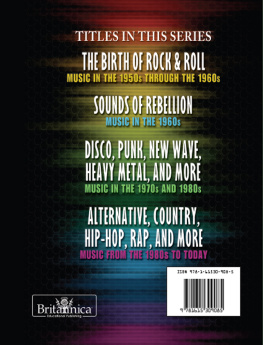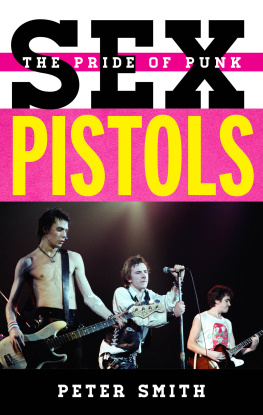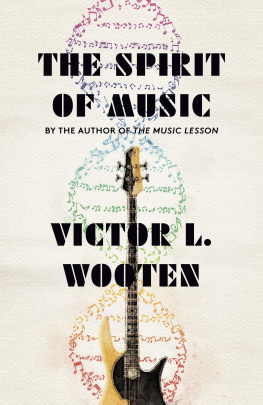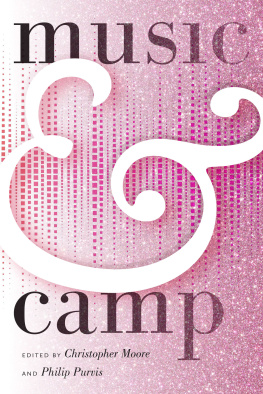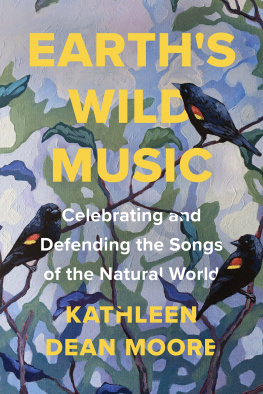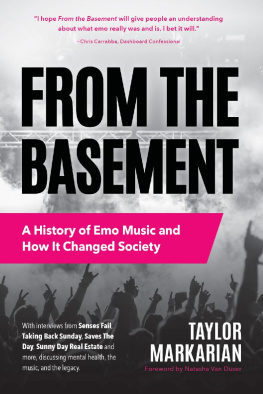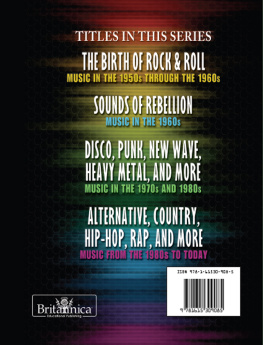Sells Like Teen Spirit
Sells Like Teen Spirit
Music, Youth Culture, and Social Crisis
Ryan Moore

NEW YORK UNIVERSITY PRESS
New York and London
www.nyupress.org
2010 by New York University
All rights reserved
Library of Congress Cataloging-in-Publication Data
Moore, Ryan, 1970
Sells like teen spirit : music, youth culture, and social crisis / Ryan Moore.
p. cm.
Includes bibliographical references and index.
ISBN-13: 978-0-8147-5747-5 (cl : alk. paper)
ISBN-10: 0-8147-5747-2 (cl : alk. paper)
ISBN-13: 978-0-8147-5748-2 (pb : alk. paper)
ISBN-10: 0-8147-5748-0 (pb : alk. paper)
1. Punk rock musicSocial aspectsUnited States. 2. Alternative rock musicSocial aspectsUnited States. 3. Punk rock musicHistory and criticism. 4. Alternative rock musicHistory and criticism. I. Title.
ML3918.R63M65 2009
306.48426dc22 2009026855
New York University Press books are printed on acid-free paper, and their binding materials are chosen for strength and durability. We strive to use environmentally responsible suppliers and materials to the greatest extent possible in publishing our books.
Manufactured in the United States of America
c 10 9 8 7 6 5 4 3 2 1
p 10 9 8 7 6 5 4 3 2 1
Contents
Acknowledgments
This book has been a long, long time in the making, sort of like my own version of Chinese Democracy (I can only hope it gets better reviews!). When I began doing ethnographic research in the San Diego scene way back in 1995, I had the good fortune to be shown the ropes by a number of musicians and all-around hipsters, particularly Rob Crow, Julie D., Brock Gallard, Dale Harris, Gary Hustwit, Hugh Kim, Aaron Mancini, Patrick Padilla, Armistead Burwell Smith IV, Jenny Stewart, Stimy, Mark Waters, and Mitch Wilson. Bob Beyerle, Larry Harmon, and John Lee not only granted me extensive, candid interviews but also lent me zines and photographs that were indispensable for my research. Tim Mays and everyone else at the Casbah furnished a second home during my grad school years, and their cooperation was essential. Paul OBeirne and Pete Reichert not only caused me to rock out on countless occasions while they were playing with Rocket From the Crypt but also poured a good pint and talked a lot of shit as bartenders at the Live Wire. Last but certainly not least, from the beginning Matt Reese served as my guide through this scene and its history, granting colorful, humorous, and thoughtful interviews and also allowing me to rummage through a lifelong collection of old punk zines, photographs, and flyers.
In graduate school at UC San Diego, I was incredibly fortunate to find a community with whom I could debate ideas, grade papers, and party (though not necessarily all at the same time!). We also walked picket lines together, and some of them served with me on the UC Strike Committee while we waged an eventually victorious struggle to unionize academic student employees at the University of California. So, in the outdated parlance of the 1990s, I would like to raise the roof for my posse of Kelly Becker, Eric Boime, Krista Camenzind, Kathleen Casey, Mark Collier, Abbie Cory, Rod Ferguson, Susan Fitzpatrick-Behrens, Rene Hayden, Rafiki Jenkins, Beth Jennings, Christina Jimenez, Dan Johnston, Melisa Klimaszewski, Tom Lide, Adam Linsen, Alberto Loza, Kelly Mayhew, Anthony Navarette, Molly Rhodes, Sarah Schrank, Matt Stahl (aka Bourbon LaMonde), Angie and Charlie Thorpe, Mark Warshaw, Glen Whitehead, and Mark Wild. Among the faculty, George Lipsitz simply led by example as a scholar, teacher, and activist. Finally, not enough could be written here about the importance of Rebecca Klatch, without whom I could not have survived graduate school. Her faith and encouragement enabled me to endure some tough times, her critical eye and diligent readings improved my scholarship immeasurably, and her open-mindedness exemplifies the best of the sociological profession.
I would also like to acknowledge the literally thousands of students Ive taught at UC San Diego, the University of Kansas, Colgate University, and Florida Atlantic University in my post-PhD years as a semi-employable vagrant sociologist. Obviously I cant thank you by name even though so many of you deserve it, but remember what I probably told you in class: youre utterly powerless as individuals, but theres no limit to what you can accomplish if you get organized as a collective, and as a whole youve certainly had an immeasurable impact on my life. Big doses of gratitude also go to those colleagues who befriended me along this journey: Bob Antonio, Dan Carey, Eve Clark, Brian and Natalie Donovan, Ophra Leyser, Hilary Lowe, Bill Staples, Robert Vodicka, and Norm Yetman for keeping me entertained in Kansas; Lesleigh Cushing, Chris Henke, Carolyn Hsu, Jason Kawall, Spencer Kelly, Meika Loe, and Ben Stahlberg for keeping me warm at Colgate; and Farshad Araghi, Liz Atzberger, Dan Bass, Ann Bran-aman, Amy Broderick, Stephen Charbonneau, Peter Fine, Eric Freedman, Mark Frezzo, Mark Harvey, Phil Hough, Marina Karides, Anna Lawrence, Chris Rob, Derek Taylor, and Patricia Widener for keeping me cool in Florida.
A big thank-you goes to Ilene Kalish and Aiden Amos at NYU Press for believing in my project and putting up with this neurotic, long-winded, and technologically inept writer. I also want to thank the anonymous reviewers whose reports on various drafts have undoubtedly improved the quality of this book. I would have been hard-pressed to find the time to finish this project without the support of a Scholarly and Creative Activities Fellowship from Florida Atlantic Universitys College of Arts and Letters.
The most significant people in my life havent been named yet. The whole damn world doesnt need to know how we met or why you rule, but I bet you still want to see your name in print and I know better than to forget about you, so here goes: Brad Augusta, Brian Augusta, Gary Baker, Kim Clouse, Stephanie Cornwell, Alicia Cox, Mike Diefenderfer, punk rock Erin, Aaron Gilbreath, Kirsten Grobien, the Helton family, the Hopeless Variety, Amy Marshall, Julie Miller, Jen Mongoven, Renee Morgan, Shawn Nanna, Jen Nevergole, Lance Parton, Mike Roberts, Sarah Schrank, Lori Seay, Lisa Smith, Tara Stephenson, Jay Tow, Lisa Vetere, the West Boca Jaywalkers, Bob Westergaard, Steve Westergaard, and Pete Williams. We havent spent much time together, but I need to thank Mike Watt for teaching the meaning of punk rock to another dude from Pedro. They cant read these words, but I still want to thank Rosie ODoggell and Abbie Paw-man for getting me out of bed every day for our morning walk and keeping me company while I write. Superhumongous doses of love go to Katy Livingston for all the support. Special thanks go to the worlds greatest mother, Lucy Moore; my father, George Moore (the real DIY writer in the family); and Carol Moore, all of whom have extended so much unconditional love and periodically saved me from starvation. There is also big love for my little brother, Kevin Moore, despite the fact that he got all the musical talent in our family, and for his wife, Lauren Stephenson-Moore, for maintaining a second home for my all-too-infrequent trips back to the Bay Area. And I want my sister, Karen Moore, and her little army of munchkins, named Benjamin, Isabella, Antonio, and Mateo, to know that they continue to inspire me to fight for a better future.
In making this list Ive realized how lucky I am to have so many fabulous people in my life. So Ive decided to dedicate my book to all of you.
1
Anarchy in the USA
Next page
